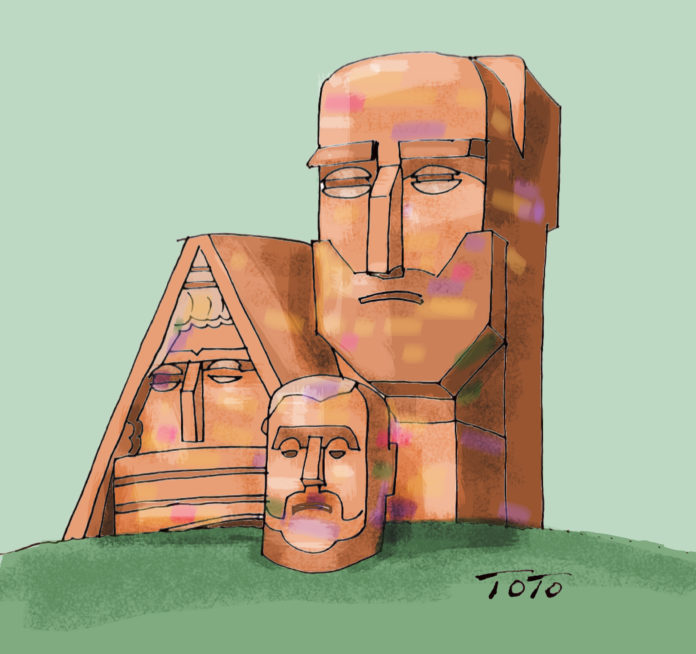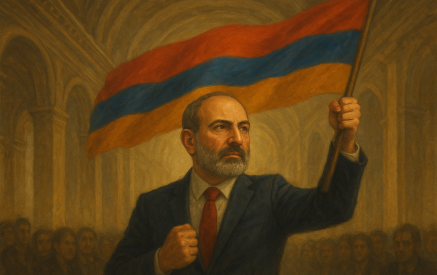by Edmond Y. Azadian
There is an ironic twist in the proclamation of the 31st anniversary of independence of Karabakh. Under normal circumstances, this occasion should have been a moment of celebration and prospect of a promising future life. But instead, all official quarters have been full of gloom and doom in the shadow of defeat at the 44-Day War.
Karabakh held its own events marking this historic anniversary, without any high-level representation from Armenia. Somber speeches were given on the occasion by Arayik Harutyunyan, president of Karabakh, and statements read from Armenia’s president Vahagn Khachatryan and Prime Minister Nikol Pashinyan. None of them came up with a positive tone or hopeful outcome. Arayik Harutyunyan referred to the destruction in the wake of the 44-Day War. Armenia’s president spoke of the “issues related to the threat of a new war, the status of Artsakh as well as the issues of humanitarian nature that [are] the permanent agenda priorities of Armenia and Artsakh.”
Read also
Pashinyan himself appealed to “the international community [which] is obliged to make efforts to address humanitarian problems caused by the 44-Day War and to prevent the implementation of the policy of the ethnic cleansing in Karabakh.”
The only person who spoke up against Azerbaijani leader Ilham Aliyev’s statements that the Karabakh issue was solved through the war was Armenia’s Parliament Speaker Alen Simonyan, who stated: “The issue of the status of Karabakh is being discussed on internal and external platforms. It is under the mandate of the OSCE [Organization for Security and Cooperation in Europe] Minsk Group co-chairs; all other discussions have nothing to do with reality.”
Many people participating in the commemorative event in Stepanakert who were interviewed expressed apprehension regarding a potential ethnic cleansing there in the mold of the evacuation of the three towns in Karabakh on August 25, namely Berdzor, Aghavno and Sus. But they also demonstrated resilience and expressed their determination to stay put “on territory of our ancestors.”
Once again, there were tumultuous discussions in the Armenian media reviewing the history and the legal developments of the Karabakh issue. There was an abundance of criticism and accusations about the negotiators of the past 31 years. Questions were raised as to whether Karabakh should have unified with Armenia or declared independence at all, and why Armenia failed to recognize Karabakh’s independence and thus rendered it an international pariah.
Many wise commentators have realized that the combined power of the Turkish-Azerbaijan propaganda machine has steamrolled over reality and pushed the false narrative of Karabakh as part of the territorial integrity of Azerbaijan, disregarding historical and legal facts.
Comparisons were made between Karabakh, East Timor, Kosovo and South Sudan, where independence or self-determination were granted on the basis of remedial cessation, something denied to the people of Karabakh.
During the last 31 years, there has not been a moment of calm and stability for the leadership to chart a reasonable future for both entities and today’s situation is more confused than ever. While tourists and Russian émigrés have been flooding Yerevan, Armenia’s citizens are licking their wounds and contemplating where their next meal will come from or planning to leave the country altogether.
To keep the anxiety of the citizenry at the highest levels, the Azerbaijani army creates daily border incidents and blames the Armenian side for them, while its government pressures Armenia to sign a peace treaty under duress, lest the political situation change with the unforeseen outcome of Russia’s war in Ukraine.
Amid this turmoil, a new voice has emerged, that of Ruben Vardanyan, a billionaire benefactor who has advanced many ideas and projects about Armenia’s future. Still, he has always been viewed with suspicion by many. He is accused of political ambitions in Armenia and his name has been mentioned recently in connection with the newly founded political party Country of Living (Aprelu Yerkir), although he denies being a member of this or any political party.
This time around, he has made a dramatic decision to renounce his Russian citizenship, turn over his billion dollars in assets to his family members and move to Karabakh. He admits the risks involved in this move, but says, “This was the right decision.”
What Vardanyan plans in Karabakh is anyone’s guess, but speculations abound.
Few commentators take him at his word that he has moved to Karabakh to use his resources and raise funds internationally to help the Karabakh people. Instead, the more prevalent view is that he is following the political path of Serzh Sargsyan and Robert Kocharyan, who used Karabakh as a launching pad for a political career in Armenia. Now that Karabakh is under siege and its future uncertain, it is questionable whether the same scenario can still be viable.
Some other commentators believe that Vardanyan had taken a shrewd step by renouncing his Russian citizenship to avoid US sanctions. Although at the present time there are no sanctions against him, his name has come up in many political discussions at the US Congress. In addition, in March 2019, the Organized Crime and Corruption Reporting Project and partners uncovered a multi-billion-dollar money-laundering network that allegedly operated through Vardanyan’s bank.
In any case, many people, including this writer, believe that he may already have made a deal with President Vladimir Putin, which explains why he is confident enough to make this bold initiative.
The press in Armenia claims that Vardanyan advocates Armenia join Russia’s proposed Union State and obtain a status similar to that of Tatarstan. However, in one interview, with Mikayel Melkonyan, he stated that Armenia should think strategically and if this scenario were unavoidable, work to attain the best possible deal. As the country as a whole is steering steadily towards the West, this prospect looks less likely. But within the context of the complex Caucasian political scene, anything can happen.
Armenians are quick to decry their benefactors. We need to wait and see if Vardanyan delivers on his benevolent pledges before questioning his motives or criticizing his plans.
Before Vardanyan, there was the precedent of Levon Hairapetyan, a billionaire from Karabakh who had built his fortune in Russia and returned to his native land to help his fellow countrymen. One of his projects was to finance the wedding of thousands of young Karabakh couples and guarantee the future education of their offspring. That was the most direct move to aid Karabakh’s future politics, because population statistics was one of the political chips in the negotiations. Hairapetyan’s plans should have been enacted by the government, which, however, lacked the resources for this, if not the vision.
What happened next to Hairapetyan and his plans were tragic. Azerbaijani power circles in Moscow were able to smear his reputation, ruin his plans and lead him to an early death in a Russian jail. Armenia’s government, at the time headed by Serge Sargsyan, maintained a cynical and cowardly silence, refusing to take a step towards his rescue.
Admittedly, Hairapetyan was foolhardy and not politically savvy and thus he fell into a trap, losing his fortune and his life. On the contrary, Vardanyan is an astute operator who certainly has learned much from his predecessor’s mistakes to avoid such pitfalls.
If we take Vardanyan at his word, he may become a valuable leading force in Karabakh and Armenia, and certainly in the diaspora, where he has broad connections.
Armenia and Karabakh are desperate and they must take advantage of any light that shines their way.

























































